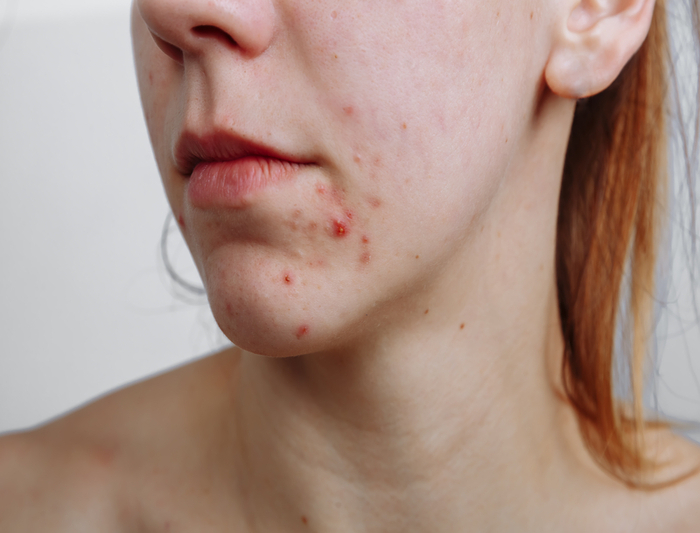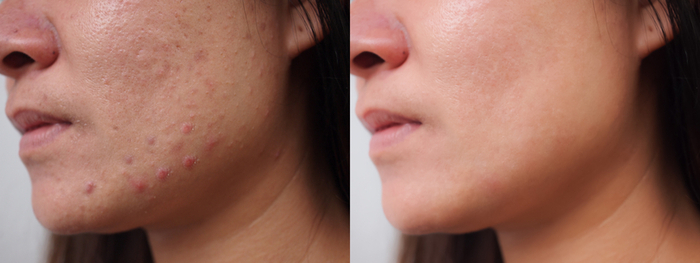- Calls to this hotline are currently being directed to Within Health, Fay or Eating Disorder Solutions
- Representatives are standing by 24/7 to help answer your questions
- All calls are confidential and HIPAA compliant
- There is no obligation or cost to call
- Eating Disorder Hope does not receive any commissions or fees dependent upon which provider you select
- Additional treatment providers are located on our directory or samhsa.gov
Does Anorexia Cause Acne?

There is no limitation to the havoc that eating disorder behaviors can cause. Individuals struggling with these disorders unfortunately find their minds, emotion-states, interpersonal dynamics, and physical bodies ravaged by the impact. The eating disordered body becomes a frightening wasteland, stripped of all nourishment, its systems incapable of performing their necessary duties.
One of these systems is the integumentary system, which refers to the largest organ of the body that is made up of “the epidermis, dermis, hypodermis, associated glands, hair, and nails [1].” The integumentary system “performs many intricate functions such as body temperature regulation, cell fluid maintenance, synthesis of Vitamin D, and detection of stimuli [1].”
The restrictive behaviors of anorexia nervosa strongly impact this system and can lead to numerous consequences, one of these being acne. According to an article published in the Clinics in Dermatology on the impact of eating disorders on the skin, acne occurs in between 47 to 59% of individuals with anorexia nervosa [2].
The relationship between anorexia nervosa behaviors and acne development can differ depending on the stage of eating disorder behaviors such as before, during, or after engagement in restrictive eating behaviors.
Acne Prior to Anorexia Nervosa
There is evidence to suggest that acne may present as a risk factor for anorexia nervosa behaviors [3]. This is believed to be the result of low self-esteem, reduction in confidence, and potential experiencing of bullying if an individual struggles with acne.
Anorexia Nervosa is characterized by a desire to achieve a thin body and this can often be related to fulfilling societal expectations of beauty. Those that engage in extreme behaviors to achieve a socially acceptable body are more likely to be susceptible to reduced feelings of self-worth and self-confidence if other areas of their bodies do not meet these expectations. Absurdly, some of these unrealistic expectations involve unobtainable, clear, poreless blemish-free skin. Those with acne might struggle with low self-worth due to their skin condition and low self-worth is a risk factor for anorexia nervosa.
Further, individuals might attempt to alter their diet. One study addresses this in noting that “ in psychologically vulnerable girls, a new dieting behavior adopted to control their acne may lead to weight loss and AN [3].”
Acne During Anorexia Nervosa
The restrictive behaviors of anorexia nervosa lead to severe malnourishment, which impacts the functioning of all organ systems of the body. The body, stripped of appropriate vitamins and nutrients, often attempts to use its current stores to find these which can lead to alterations in how all systems function. For example, one study noted that “hepatic, renal and thyroid functioning problems related to anorexia can…bring about pruritus, which is severe itching of the skin [2].” This severe itching of the skin can lead to increased scratching and touching, resulting in oil deposits into pores.
The skin also dries due to anorexia nervosa behaviors. When this occurs, the body sends more oil deposits to lubricate the skin, which may lead to pore clogging.

Acne in Recovery
Acne is also a common symptom of refeeding when individuals are working toward recovery from anorexia nervosa and renourishing their bodies. This is often related to the “hormonal changes associated with weight gain triggering the development of acne [2].” As individuals refeed, they not only experience increased vitamin and nutrient supply, their organ systems may work differently than they did previous to their eating disorder. This can lead to “the onset of acne in some patients only at the time of weight gain and at a weight when they were previously not affected by acne [2].” This “suggests a mechanism related to the re-establishment of physiologic homeostasis, especially relating to endocrine function [2].”
Regardless of the time acne presents, it can be a difficult experience to overcome, as our society is not kind regarding physical imperfections that differ from unrealistic societal expectations. Just as individuals struggling with eating disorders must increase their self-worth and improve their self-view regardless of their body weight, shape, or size, they must also do so regardless of their skin presentation.
References
[1] Kim, J. Y., Dao, H. (2021). Physiology, integument. StatPearls Publishing. Retrieved from https://www.ncbi.nlm.nih.gov/books/NBK554386/. [2] Strumia, R. (2013). Eating disorders and the skin. Clinics in Dermatology, 31:1. [3] Strumia, R. (2009). Skin signs in anorexia nervosa. Dermato-Endicrinology, 1:5.The opinions and views of our guest contributors are shared to provide a broad perspective on eating disorders. These are not necessarily the views of Eating Disorder Hope, but an effort to offer a discussion of various issues by different concerned individuals.
We at Eating Disorder Hope understand that eating disorders result from a combination of environmental and genetic factors. If you or a loved one are suffering from an eating disorder, please know that there is hope for you, and seek immediate professional help.
Published March 21, 2022 on EatingDisorderHope.com
Reviewed & Approved on March 21, 2022, by Jacquelyn Ekern MS, LPC
Margot Rittenhouse, MS, PLPC, NCC is a therapist who is passionate about providing mental health support to all in need and has worked with clients with substance abuse issues, eating disorders, domestic violence victims, and offenders, and severely mentally ill youth.
As a freelance writer for Eating Disorder Hope and Addiction Hope and a mentor with MentorConnect, Margot is a passionate eating disorder advocate, committed to de-stigmatizing these illnesses while showing support for those struggling through mentoring, writing, and volunteering. Margot has a Master’s of Science in Clinical Mental Health Counseling from Johns Hopkins University.

